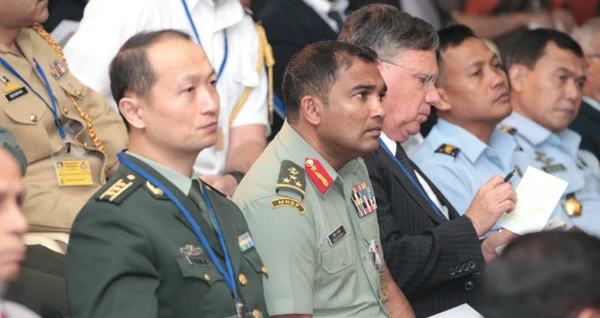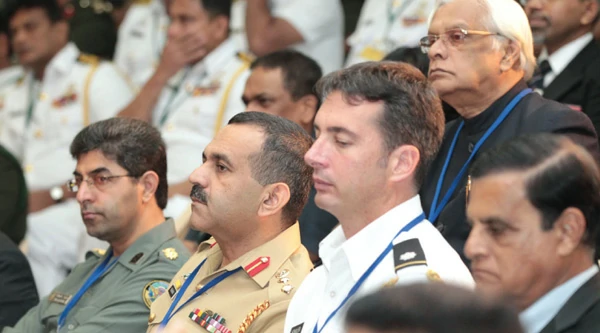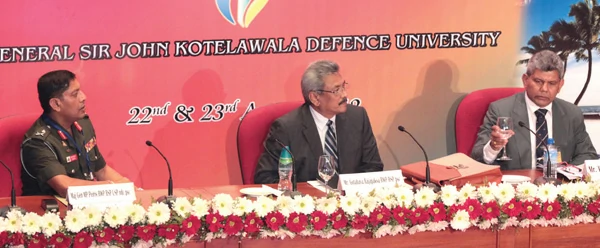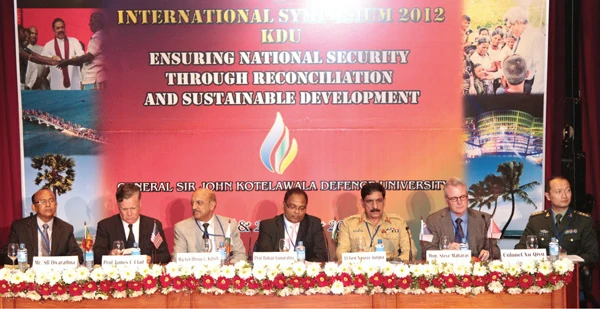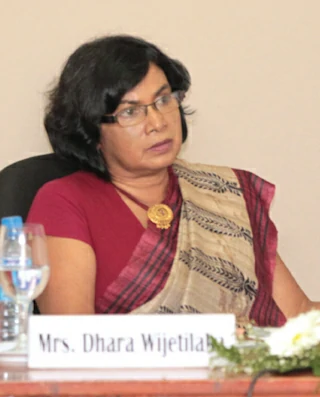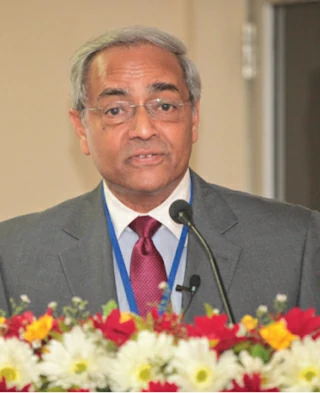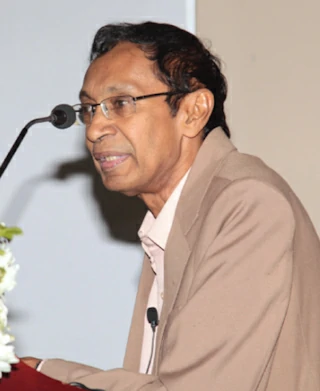
The annual Symposium of the General Sir John Kotelawala Defence University this year focused on the highly relevant theme, ‘Reconciliation and Sustainable Development as an Instrument for Ensuring National Security’. Both local and international luminaries participated in the Symposium, sharing their views on this topic, leading to a greater understanding of the challenges ahead, the steps that have been taken and those that need to be taken to establish greater prosperity, development and security of Sri Lanka.
Compiled by Ayesha Inoon, Manisha Wijegoonewardene and Kamalika Jayathilaka
Assisted by Bhavani Bala and Jezmin Goonetilleke Photography Menaka Aravinda and Damith Wickremasinghe
Welcoming national and international dignitaries and participants to the symposium, the Vice Chancellor of the Kotalawala Defence University (KDU) Maj Gen M P Peiris established the relevance of the theme to ensure the future stability of the country and the importance of ensuring harmony between the communities. He said that once achieved such reconciliation should be cemented and consolidated through constitutional means.
Elaborating on the interconnection between national security, reconciliation and sustainable development he expressed his belief that the symposium would bring about a greater understanding of these matters. Deliberating on the events that threatened our national security in the post-independence era, he said that the farsighted leadership of President Mahinda Rajapaksa and the Secretary of Defence and Urban Development, Gotabaya Rajapaksa, had finally brought relief to our nation that is now aspiring to become the Wonder of Asia.
Stressing the importance of being proactive in ensuring national security, he said that despite the complexity of threats in the present day Sri Lanka had maturity, character, determination, resilience and application with which to move forward.The symposium itself was a proactive measure that would enable us to delve deeper into the concepts of national security, reconciliation and sustainable development and how best we could ensure the national security of our country.
“Sri Lanka Is Ready To Fly Again Into A Future That Every Individual Of The Country, Irrespective Of Differences, Can Be Proud Of”
“Today, we are ready to take a new path. Like the legendary phoenix rising from the ashes, Sri Lanka is ready to fly again into a future that every individual of the country, irrespective of differences, can be proud of,” Maj Gen Peiris said.
In his keynote adress, Gotabaya Rajapaksa, Secretary to the Ministry of Defence and Urban Development reflected on the aptness of the theme. Speaking on the end of the three-decade long war, Defence Secretary said, “today, the country is experiencing a national revival that will restore it to its rightful place on the world stage. The challenge before the Government is to facilitate this resurgence whilst taking necessary steps to ensure long-term peace and stability by upholding national security.”
Having achieved the objective of restoring peace and stability to the nation, he said, it was now time to move the country forward and exploit the opportunities afforded by peace, adding that the Government was working hard to achieve national reconciliation and sustainable development.
Citing the challenges faced by the Government in the post war period, including the care of IDPs, demining, reconstructing of the villages, facilitating their resettlement and dealing with the LTTE cadres who surrendered to the Security Forces, Defence Secretary said that the speedy resolution of these issues was critical to the restoration of normalcy.
Explaining the overall context in the North and East during that period, he said the areas under LTTE control had been in virtual isolation from the rest of Sri Lanka for decades with a subverted democratic process that gave the illusion of a state apparatus. Furthermore, economic development in these areas was lagging.
“Developing the regions formerly under LTTE control was the primary challenge that the Government faced in the post-war situation,” he said, expanding on the liberation of the Eastern Province and its return to normalcy and democracy with the elections being held there as early as May 2008 and the Eastern Dawn programme revitalising sectors such as crop agriculture, livestock, fisheries and tourism.
He explained that although the President appointed a Presidential Task Force to affect a similar revival in the North, the situation there was much more complex. “The LTTE had been in control over much of the territory in the North for many years, thereby leading to the suppression of its natural potential for a much longer period.”
Demining took place in approximately 5,000 sqkm with priority being given to the speedy return of civilians to their homes. He noted that while two main priority areas have been almost completely cleared they expect the areas where the highest concentration of mines also to be completely cleared very soon. He went on to provide the facts and figures on reconstruction, particularly on the construction of housing units which expedited the resettlement programme.
Speaking of the “Northern Spring” initiative launched by the Government to undertake large development projects in the North, he explained the improvements done such as the upgrading of essential infrastructure and larger undertakings such as township and road network development, building of bridges and restoration of railways.
Furthermore, he said, irrigation infrastructure has been restored in order to revive agriculture and farming, and major programmes to upgrade drinking water supply and sanitation are also underway. Electrification has been expedited, provision of healthcare is being enhanced and schools are being restored.
“Resettling nearly 300,000 internally displaced people in just over three years is a significant and laudable achievement by any standard, and it has enabled the long suffering people of the North to once again live their lives under the conditions of normalcy experienced by everyone around Sri Lanka,” he said.
Another significant challenge before the Government was dealing with the LTTE cadres who surrendered or were detained. Elaborating on the unusual approach adopted by the Government, Gotabaya Rajapaksa said that the majority of them were placed in rehabilitation programmes as opposed to being prosecuted and punished. Furthermore a special UNICEF supported rehabilitation programme was organised for the 594 child soldiers who had surrendered.
“All adult beneficiaries underwent extensive programmes that were designed to de-radicalise them and equip them with the ability to return to normal life in society,” said Defence Secretary stressing that several International agencies and Non Governmental Organisations such as the IOM and UNICEF were given free access to the rehabilitation centres.
Counselling was a major component of the rehabilitation programme. The purpose was to affect attitudinal change and develop individual personalities. He elaborated on the priority given to the reunification of families, particularly at the rehabilation centres called ‘Peace Villages’.
“All Reintegrated Beneficiaries Of The Rehabilitation Programme Have Been Given An Opportunity To Resume Normal Lives In Society”
The research conducted by Dr Kruglanski and Dr Gelfland of the University of Maryland, College Park, USA, he said, indicated that the rehabilitation programme has been effective even for the most hard-core LTTE cadres. “All reintegrated beneficiaries of the rehabilitation programme have been given an unparalleled opportunity to resume normal lives in society.”
Defence Secretary reflected on the progressive removal of various restrictions in the North being a significant step towards restoring normalcy, including restrictions on travel on foreigners, media personnel and NGO staff and restrictions on the transport of certain items. Today, he said, there was complete freedom of movement in the North and a large increase in both local and foreign tourists with a considerable number of them being expatriates visiting their ancestral homes, properties and relatives in Sri Lanka.
Many restrictions that were in place at sea due to the grave threat posed by the LTTE’s Sea Tiger wing were also removed. There was a significant reduction in the numbers of security barricades, roadblocks and checkpoints in the North and East – in 2009 there were approximately 2,000 of these in these two Provinces while there are hardly any today.
He also pointed out that the presence of Security Forces personnel in the North has been greatly reduced, and while Military camps will remain in strategic positions to uphold national security, which is a fact throughout the country, the presence of Military personnel will be unobtrusive.
The local authority elections, Presidential Election and General Election held in the Jaffna Municipal Council and the Vavuniya Urban Council in 2009 and 2010 were the first in which people throughout the entire country could vote freely and without fear of LTTE reprisals. He said, “the swift restoration of democracy and the right to vote has returned to the people and their voice in governance. It is an incredibly significant achievement.” He further stressed the importance of putting behind the past along with any suspicion of discrimination while having confidence in the leaders and building a brighter future for the nation.
Speaking of the importance of all citizens having equal access to services provided by the State he expressed his satisfaction at the ability to increase the numbers of Tamil speaking Policemen with 11 new Police stations being established in the North.
“The renewed economic opportunities and freedoms that the people of the North now enjoy are vastly different from what they were when much of the Province was under the LTTE,” said Gotabaya Rajapaksa, adding that now the people of the North no longer had any reason to feel isolated or disfavoured.
“I have every confidence that they will make full use of these opportunities, and that it will not be long before the Northern Province is a flourishing and vibrant region of our Nation. That is why I am certain that the path the Government is presently on is the best way in which to ensure long-term peace, stability and national security,” he concluded.
Chaired by Prof Rohan Gunaratne, Defence Analyst, the first plenary session at the symposium was dedicated to the field of Defence. In his introductory remarks Prof Rohan Gunaratne stated that in the 21st century the first insurgent and terrorist campaign to be defeated in the world was the campaign in Sri Lanka and stated that rehabilitation is step one in reconciliation.
“In terms of the global terrorist rehabilitation programmes Sri Lanka has built a world class rehabilitation programme,” added. He further stated that Gotabaya Rajapaksa, the Secratary of Defence is not only the architect of defeating the LTTE but is also the principle architect of the reconciliation strategy for Sri Lanka. What is unique in Sri Lanka according to Prof Gunaratne, is that those war fighters have today become the champions of peace having understood that it was not only essential to isolate and to eliminate terrorism but it was also equally important to reach out to those people who were radicalised and who became victims of the terrorist ideology. The strategy that has been adopted by the Sri Lankan Government to defeat terrorism and restore peace was to stabilise the country through reconciliation.
He also added that the strategy adopted by Sri Lanka was not punitive justice but restorative justice. The ex-combatants have been given a second life where the rehabilitation centres have basically provided them the skills and the training not only physical but also psychological so that they reintegrate successfully into society and live as citizens. “If you look at the Sri Lankan conflict in the context of other insurgencies there was not only the skill but also the will on the part of the Government and the Military forces of Sri Lanka not only to apply the necessary counter terrorism strategies but also to apply the strategies to restore life in those areas so that there will be no relapse back to violence,” said Prof Gunaratne.
The Challenge Sri Lanka Faces Is Failing To Have A Good Information Campaign Which Is Crucial For Sri Lanka Within The Next Few Years
The challenge Sri Lanka faces he stated is failing to have a good information campaign which is crucial for Sri Lanka within the next few years to build specialist centres to counter the misinformation and the disinformation.
Maj Gen Dhruv C Katoch, Additional Director, Centre For Land Warfare Studies (CLAWS), India, commended the political and Military leadership of Sri Lanka on their victory over the forces of terror, saying very few nations have achieved such. He discussed the definition of national security and the internal and external factors to be taken into consideration, adding that it should include overcoming threats to peace, the avoidance of conflicts and confrontations and the preservation of the lives of the inhabitants and hence also be viewed in terms of achieving reconciliation among the diverse groups in a society.
He further elaborated on the Military approach to national security and its ramifications as well as the reasons for conflict in the country such as the issue of language, drawing parallels to the conflicts between India and Pakistan. Although uniformity is considered to be an essential requirement for unity he felt that we can celebrate our differences and still remain united with the bridge of understanding.
Dwelling on the aspect that federalism does not imply separatism, he cited how a look at India’s volatile Northeast shows how the policy of accommodating regional aspirations can lead to peace and the prime example of the state of Mizoram which stands as a symbol of the success of the federal structure.
He also highlighted the aspect of justice, saying, “conflict demands closure and that can only come about through justice, which not only has to be delivered but must be seen as being delivered.” He added that the prime causes of conflict needed to be addressed to ensure the long term impact of the victory and legal punishment must be meted out to those responsible for crimes against humanity.
“Sri Lanka Has Shown The World How To Win A War Against Terror, THE Country Now Needs To Demonstrate Its Capacity To Win Peace.”
He concluded that while economic development is a catalyst to peace it is not the prime mover, adding that wounds can heal faster through sustainable development and when integration is done through economic dependencies, the effects are more permanent. “Sri Lanka has shown the world how to win a war against terror,” he said, “the country now needs to demonstrate its capacity to win the peace.”
Addressing the gathering, Lt Gen Naseer Janjua – President National Defence University, Pakistan expressed his pleasure that Sri Lanka had arrived at a stage in history when the topics of national debate have shifted from conflict and violence management to the topics of peace, reconciliation and development. However, he said, many countries elsewhere in the region remained engaged in diverse conflicts and violence.
Reconciliation, he said, was the dawn of realisation and about building relationships where individuals, societies and nations move from a divided past towards the shared future. Security and development was but the natural outcome of reconciliation – however, nations continued to suffer blindly by opting for war.
Briefly touching on the concept, he advised that a state must be speedy in identifying and addressing the grievances of social segments, reconciliation must be launched in good time and at a broader base extended to communities and force should be kept to a minimum while reconciliation through political means must take over and usher an era of peace and stability.
Lt Gen Naseer Janjua further spoke of reconciliation at the regional level and the bigger challenges it posed, saying that “peace and reconciliation between nations and among rival factions within the country are not achieved in a vacuum. There are numerous steps that must be taken and obstacles to overcome to create a solid foundation for peace and reconciliation and chief among them are leadership and willingness to forgive if not forget.”
He reflected on the ground realities in the region with reference to the turbulence and diversity of South Asia, the threat of nuclear warfare and how this has reintroduced the phenomena of strategic inequality undermining reconciliation and peaceful coexistence within the region.
He urged everyone to embark upon a quest for regional reconciliation, that would help nations to rise above their existing animosities and make the region a safer place. He concluded that, “we cannot change each other as neighbours and as it is popularly said, we are prisoners of geography. Then it is time now to accept each other and make a new beginning; sowing seeds of friendship and prosperity. Time for healing the wound is here. If all else is not possible and we cannot be friends let’s at least not be enemies. This is the minimum which we all owe to our future generations.”
James C Clad, a distinguished research fellow from the National Defence University in the USA, in his speech, reflected on the practical difficulties of national reconciliation from his experience with examples from countries such as Myanmar, Indonesia, Malaysia and India as well as the USA and New Zealand. He discussed some of the regional and global dimensions of reconciliation with specific references to India and the Middle East. He pointed out that regionally there were many factors in favour of Sri Lanka’s economic growth and that these advantages would benefit reconciliation.
Steve Maharey, Vice Chancellor, Massey University, New Zealand spoke of the ‘Role of 21st Century University’: International perspective stating that in the 1800’s there was a major conflict between the British and the indigenous New Zealanders which recurred 30 years ago affecting families, businesses etc. It was the colonisation that led to war, confiscation of land and much more. Everyone argued that the Waitangi treaty that was signed between the crown and indigenous people in the middle of the 1800’s should be realigned. By discussions, offering economic stability, considering the injustices, making an apology for a treaty which was over a century old was actually a successful process.
According to Maharey the universities run along these conflicts and help assist the country to move forward by focusing on security, social development and economic development, while allowing people to feel they are a part of the reconciliation. That is how universities assist the country to move forward.
“In my role in universities for the last 20 years I have been involved in a range of efforts to make policies which may help the country move forward. The Massey University in Auckland is the largest in New Zealand. This is where people felt that they could identify injustice,” he added.
Language is one component that triggered arguments he said adding that the Maori wanted to speak and live as Maori but the governing language was English therefore they lacked the ability to use their language widely.
The ‘learning for life reforms’ in the 1990’s and universities paying attention to social economic technological changes communicated that the issues causing tension in the societies are being addressed. Another change was opening doors of tertiary education for everyone. The number of people entering the universities in the 1990’s was coming mainly from British and European origin. The education loan schemes introduced by the government increased the numbers in universities including non British origin students he continued.
The recent step taken was to enroll more people and make them more diverse. The government has set out a plan focusing on economic and social development while addressing environmental goal. Universities are given set priorities which they need to focus and respond to. University of New Zealand has to develop their own plans concentrating on the people around their community and make sure they deliver accordingly; taking off pressure from the society.
Even in the area of research the same happened since research was oriented towards discipline and not the issues prevailing in the country. Academics in New Zealand have changed their research areas focusing on their accountability to the community, their communication and considering whether the research is relevant to what is going on in the country. These changes in research and education have helped the country to move forward.
“From what we are trying to do in New Zealand, the 21st Century University is strategically focused. They achieve and implement their plans and goal within the local and international context. They are open to new ideas, willing to take risks and engage people in new ways. Most of all they’re ecological universities, connected to their communities, locally and internationally,” he explained.
The argument in New Zealand is that universities are drivers of change and they have ensured that society becomes increasingly diverse. “We who are part of universities feel that we have responsibilities to help the country move forward,” explained Steve Maharey.
Speaking on the ‘The Role of Armed Forces in Sustainable Development’, S B Divaratne, Secretary to the Presidential Task Force for Resettlement, Development and Security, Northern Province, said that this was a subject that has captured the attention of many countries due to the importance of utilising the services of professional armies for many facets of sustainable development, the need for collaboration of many different Governmental Agencies helping the nations to build strong institutions and thriving economies and the emphasis given to the idea that global security is routed in people and communities.
With nearly seven years of involvement with the Armed Forces, particularly during the critical period of Sri Lanka’s conflict with the LTTE, when he served as Commissioner General of Essential Services, he outlined his thoughts on what the role of the Sri Lanka Armed Forces should be in sustainable development. He described the commitment of the Sri Lanka Navy that he witnessed during his tenure between 2006 – 2009 to sustain the life of civilians in Jaffna saying that these services were part of the strength of the Military service which could be used to sustain development even in emergency situations.
“The Armed Forces Have Secured The Country From Terrorism And Laid The Foundation For Peace And Stability”
Elaborating further on his experience with the Armed Forces in post conflict development in the Northern region after the recent Humanitarian Operations, he said that the Armed Forces have secured the country from terrorism and laid the foundation for peace and stability. In terms of the development of the economy he pointed out that contribution of the Northern region to the Gross Domestic Product (GDP) has increased almost threefold.
Expanding on the role of the Armed Forces in demining and resettlement, he said, “these humanitarian interventions contributed to restore the lost confidence of the people. The Armed Forces utilised its trained manpower and skills with utmost efficiency to assist the development momentum in the post-conflict situation.”
The skills and professionalism of the Armed Forces were now being utilised in the major task of Urban Development in Colombo, he said, and could also be used for development of vocational training in the country. Their talents in the field of administration and IT could also be made use of.
He explained that the Armed Forces had moved out of their stereotypical roles and embarked on rebuilding the nation and could even play a role in a social context by engaging in social reconciliation and the creation of social bonds for the next generation to continue by strengthening the North-South interaction to regain what had been lost for 30 years and creating a situation to sustain the ongoing social and economic development.
“The Armed Forces Have The Conscience To Ensure Security Of The Country. They Serve The Country By Reducing The Threat For Security Because The Heart Of The Armed Forces Is To Heal The Nation And Building Internal Coherence As People As A Society…”
In conclusion, he said the Armed Forces had a definite role in the development of a country. “Today they can use the mammoty but tomorrow they may have to take a weapon. The Armed Forces have the conscience to ensure security of the country. They serve the country by reducing the threat for security because the heart of the Armed Forces is to heal the nation and building internal coherence as people, as a society and as a community of the nation.”
Col X U Qiyu, NDU from China spoke on “Ensuring National Security through Reconciliation and Sustainable Development – Global Perspective,” stating that reconciliation and sustainable development have become increasingly integrated into national strategies to achieve security and stability.
According to Col X U Qiyu, the global trend that began in the second half of the 1990s in many countries became aware that it is only through effective reconciliation and sustainable development that they can achieve security and stability in domestic or regional terms. A substantial number of countries from different regions of the world adopted this policy.
He emphasised that countries such as Rwanda, Bosnia-Herzegovina, Iraq, Afghanistan, and Sri Lanka are highly diversified in terms of domestic security conditions. To facilitate research and analysis these countries can be categorised as post-civil war/conflict countries, post – COIN/CT countries, post-war countries, countries in conflict, countries dealing with domestic strife among different religious/ethnic groups and countries just taking “preventive” reconciliations.
Col X U Qiyu added that the reconciliation strategies taken by all those countries have similarities despite the diversified domestic conditions. These similar steps include creating an enabling environment for reconciliation to take place in earnest which ensures peace and security in all parts of the country and return of refugees to their homes.
Reinforcing law is also a similar step of the reconciliation process, it means ruling out future attempts to take advantage of the unfortunate past. Institutional arrangement involves building institutional infrastructure, making a guarantee that each group or party has necessary political incentive to join the process. An important aspect of this point is that there is the need to ensure the administration has necessary power to push forward the reconciliation process, he went on to say.
“The socio-economic approach is also another similar step of the reconciliation process,” he continued adding that, “the launch initiatives that can improve living conditions of people, reducing barriers among different groups and communities.” Cooperation with international community and continuing efforts of fighting against sectarian ideology are the other two similar reconciliation strategies but the national administration should always take the lead.
Speaking on the importance of sustainable development for reconciliation and long-term national security sustainable development and reconciliation are two mutually supportive pillars for the national security and stability. But for some countries the most crucial problem is how to achieve basic economic recovery and prevent the nation from falling back.
The core meaning of sustainable development is establishing harmonious relations among the economy, society and environment. For countries to achieve sustainable development they need to stress on the interactions between the economy and society. That is to enlarge the number of people who can benefit from economic development and to build a society of equality and justice.
In conclusion, he said that reconciliation and sustainable development is the only way to ensure national security in long-term while reconciliation processes of different countries vary from each other. The strategies, actions and the administrative capacity is often the key variable in the process. Sustainable development is an essential component for most countries’ reconciliation process.
At the Parallel Plenary Session on Law Chaired by Dhara Wijethilaka, Former Secretary to the Ministry of Justice interesting factors of importance in the current context pertaining to aspects such as sovereignty, the LLRC Report, Human Rights and reconciliation were aptly discussed.
Former Attorney General Mohan Peiris discussed the concept of sovereignty in a Sri Lankan context, explaining the definition in the legislation and its parameters.
“By sovereignty, we mean, the supreme, the absolute and un-limitable power by which an independent state is governed,” he said, adding that it is connected to the ability of the state to guarantee the best interests of its citizens and if a state cannot live up to that guarantee then it is said that that state does not enjoy sovereignty any longer.
He then questioned if the concept of sovereignty had changed in recent times, postulating that the expanding covenants of international law had brought about a global change which he went on to explain with examples of treaties and covenants that Sri Lanka had entered into such as the International Covenant for Civil and Political Rights, and the ramifications of such.
Discussing sovereignty in a global context he cited examples of Military and humanitarian interventions in a number of countries that were carried out in the premise that they constituted humanitarian interventions aimed at preventing genocide, large scale loss of life, ethnic cleansing or the use of weapons of mass destruction.
Even the Westphalian concept of nation-state sovereignty, he said, is something that can crumble under international pressure.
He concluded, “however sovereign we are, when we are in another land we are willing to give up that sovereignty and fall in line with some other sovereign. I leave you with the thought, how sovereign is sovereignty?”
Highlighting the National Action Plan for the Protection and Promotion of Human Rights, Justice Priyantha Perera, Chairman of the Human Rights Commission opened the parallel plenary session on Law stating that the Government of Sri Lanka embarked on this important cause of action to respond to the out cry of the people of this country.
“This document in my view, provides a detailed policy and legislative programme to realise the fundamental rights and the freedoms provided by the constitution of Sri Lanka. This is also an opportunity to expand these rights and freedoms,” elaborated Justice Perera.
Further, he explained that a task force has been appointed by the Cabinet to oversee, facilitate and implement the recommendations headed by Lalith Weeratunga, Secretary to the President comprising of representatives of all stakeholders, ministries and state institutions. He added that the action plan has recommendations and sub recommendations under five main themes of International Humanitarian Law, Human Rights, Land Reform and Settlements, Restitutions and Compensation.
Moving on to discuss some of the recommendations and their implications Justice Perera elaborated on the introduction of immediate steps to investigate abduction, involuntary disappearances and arbitrary detention allegation and bringing the perpetrators to justice by the law enforcing authorities.
He added that the Ministry of Defence, the Police department, Legal Aid Commission and the Ministry of Justice have been entrusted with the work to identify impediments as well as to build up the capacity within the Police department for an effective surveillance mechanism and establish community policing among other tasks.
“Full Implementation Of The National Action Plan Will Benefit All Citizens Of Sri Lanka By Furthering A Long Term Reconciliation And A Lasting Peace, Which Remains A Key Policy Of The Sri Lankan Government On The LLRC.”
“Full implementation of the National Action Plan will benefit all citizens of Sri Lanka by furthering a long term reconciliation and a lasting peace, which remains a key policy of the Sri Lankan Government on the LLRC,” stated Justice Priyantha Perera.
Moreover, he explained that the policy of openness followed and presented in the National Action Plan to the public and the discussion held with the diplomatic community has shown very good results.
“Implementing these various matters, the corporation of Human Rights Commission of Sri Lanka would be hundred percent available. The Commission is dedicated to this cause. And I can give an assurance that we can do our very best to ensure that all these matters are implemented for the benefit of the society,” concluded Justice Priyantha Perera.
Prof Karunaratne Hangawatta of the University of Nevada, USA, speaking on the aftermath of the LLRC, the reality and the rhetoric, introduced the concepts of perceptual reality and objective reality. He aptly discussed some of the local and international public discussions that have been on the surface since the release of the LLRC Report.
Prof Karunaratne explained that with the internationalisation Sri Lanka came to be viewed due to propaganda as a ‘failed State’. “Especially after the war, the rule of law, good governance, equality, human rights, war crimes and accounting for war crimes have become major instruments of utility for the so-called international community because, some of those who claim to be international community are not necessarily members of the international community,” he added.
“The biggest weakness of the LLRC Report is that to some extent, it accepts but not directly the assumption that Sri Lanka is a failed state and moves on to make recommendations,” he explained. In this sense, he claims that the LLRC missed an opportunity to challenge assumption that Sri Lanka is a failed state by showing that the foundation and the pillars upon which these assumptions are based are intellectually unreasonable.
Returning to the rhetoric and reality Prof Karunaratne examined the processes and the experiences of war and peacetime and discussed violence during and after war, economic stress, legitimacy, education and welfare as well as public policy among others. “There are different types of violence for different reasons. You cannot just look at a single type of phenomena and blame the Government for everything,” he stated.
It was also mentioned that with regard to reconciliation the biggest issue the country has to face has been the internalisation of domestic issues and the failure to examine issues empirically based on observations and yield into rhetoric. “Addressing ethnic harmony alone will not solve the ills of the Sri Lankan society. There are national issues rooted at the social level but no national questions,” explained Prof Karunaratne.
“In A Democracy Inequities Need Not Be Resolved For Reasons Of Fairness Due To Distributive Justice, Simply Because Such Inequities Undermine Democratic Legitimacy”
“In a democracy inequities need not be resolved for reasons of fairness due to distributive justice, simply because such inequities undermine democratic legitimacy,” concluded Prof Karunaratne Hangawatta.
Addressing the gathering, Senior Lawyer Gomin Dayasiri stressed that the country could not become complacent after going from the most insecure to the most secure nation in the region after the ending of the war. He pointed out that there were still rumblings from the diaspora and foreign elements that support the concept of Eelam.
It was important to address the genuine grievances of the Tamil population, which had been identified by the LLRC he said, which was different to giving power to Tamil politicians. He explained that the TNA was attempting to revive the concept of Eelam through the 13th Amendment in the guise of democracy. While perhaps democracy gave them the right to surface, surveillance and security were important and the country required to be guided by intelligence gathering. Military intelligence gathering alone however is not sufficient, Police powers also had to come into play.
Pointing out that the TNA had two objectives – to get Police powers and to remove the Military presence from the North and East, he said this was symptomatic of what was to come, and it was the duty of lawyers and knowledgeable people such as himself to safeguard these. He also expressed his confidence that the President and the Government were strong enough not to concede to their demands.
In conclusion, he said it was good to identify and understand who the enemy was after the hard won peace after 30 years of terrorism. “I have tried my best in my own humble way, I have identified who would be the potential candidates of terror. I would always say that Prabhakaran is a terrorist who called himself a terrorist but we have now terrorists who wear masks and cloaks,” he said, reiterating the necessity of settling Tamil grievances, because, “that is the bridging point, that doesn’t require any constitutional amendment. Our laws are sufficient, our administrative powers are sufficient to grant them that relief. If we do so, I think we can have a Sri Lanka that is truly lived in unity which I think must be kept as it is for our next generation.”
